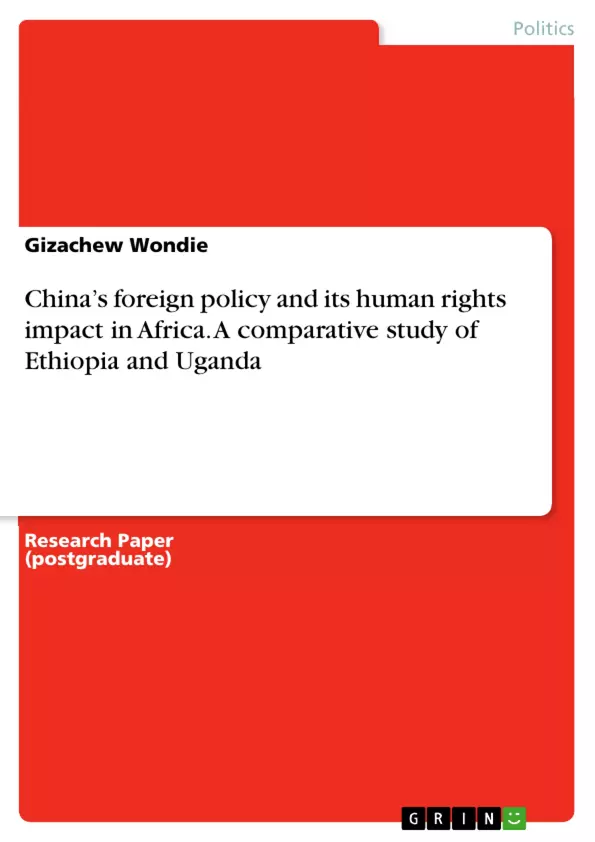This paper seeks to address the correlation of foreign policy of states on human rights in general and the foreign policy of China on the human rights situation of Africa in particular, with special reference to Ethiopia and Uganda. The paper tries to specify why the African states welcomed China and pushed out Europeans and the USA, which are far more coercive states for human rights development and democratization than China. It also seeks to give an overview of China’s approach to human rights in it foreign relations juxtaposed with the human rights situation of selected African countries (Ethiopia & Uganda) before and after the coming of China to the continent.
Inhaltsverzeichnis (Table of Contents)
- 1. BACKGROUND OF THE PAPER.
- 1.1. Introduction
- 1.2. An Overview...
- 1.3. Understanding foreign policy.
- 1.4. Foreign policy and human right
- 1.4.1. China's foreign policy.
- 1.4.2. China's foreign policy and human right........
- 1.5. An overview of Africa China relation
- 1.5.1. The material need
- 1.5.2. Access to new market and investment areas
- 1.5.3. Political Influence
- 1.5.4. Case of Taiwan........
- 1.6. The place of human rights in Africa-China foreign relation
- 1.6.1. Prioritization of economic and social rights
- 1.6.2. The development paradigm.
- 1.6.3. Focus on group right
- 1.6.4. Stability as a precondition.
- 1.6.5. Why China succeed in Africa?.
- 1.6.6. How human rights affected?
- 2. THE INVESTIGATION OF THE IMPACT OF CHINA'S FOREIGN RELATION IN ETHIOPIA AND UGANDA .
- 2.1. Human right experience of Ethiopia...........
- 2.2. China's investment intention and impact on human right in Ethiopia .
- 2.3. Human right experience of Uganda.........
- 2.4. China's Investment Intention and Impact on Human Right in Uganda
- 3. FINDINGS FROM THE TWO CASES
- 4. CONCLUSION.
Zielsetzung und Themenschwerpunkte (Objectives and Key Themes)
This paper aims to examine the connection between state foreign policy and human rights, specifically focusing on the impact of China's foreign policy on the human rights situation in Africa. The paper will analyze why African nations have sought partnership with China, preferring it over Western nations often seen as more coercive in promoting human rights and democratization. The paper will also explore China's approach to human rights in its foreign relations, juxtaposing it with the human rights situation in select African nations, Ethiopia and Uganda, before and after China's increased presence on the continent.
- The relationship between foreign policy and human rights.
- The impact of China's foreign policy on human rights in Africa.
- The reasons for Africa's preference for Chinese partnerships over Western ones.
- China's approach to human rights in its foreign relations.
- The human rights situation in Ethiopia and Uganda before and after China's involvement.
Zusammenfassung der Kapitel (Chapter Summaries)
The first chapter provides background information, explaining the concept of foreign policy and its relation to human rights. It delves into China's foreign policy, specifically its approach to human rights and the reasons behind its growing presence in Africa. This chapter also explores the motivations behind China's involvement in Africa, including the need for resources, access to new markets and investment opportunities, and the pursuit of political influence.
The second chapter focuses on investigating the impact of China's foreign relations on the human rights situation in Ethiopia and Uganda. It analyzes the human rights records of these two African nations, considering their experiences with Chinese investment and development cooperation.
Schlüsselwörter (Keywords)
The primary themes and concepts explored in this text include foreign relations, foreign policy, China-Africa relations, human rights, investment, development cooperation, human rights promotion and protection, economic and social rights, and the development paradigm. The paper specifically examines the human rights situation in Ethiopia and Uganda in the context of their relationships with China.
Frequently Asked Questions
Why do African states like Ethiopia and Uganda prefer Chinese partnerships?
African nations often welcome China because it offers investment and infrastructure without the strict political conditions or human rights demands typical of Western nations and the USA.
What is China's approach to human rights in foreign policy?
China prioritizes economic and social rights (the "right to development") over civil and political rights, emphasizing state stability and non-interference in internal affairs.
How does Chinese investment impact human rights in Ethiopia?
The study explores how large-scale Chinese infrastructure projects contribute to economic growth but may also support a government that prioritizes stability over political freedoms.
Does China influence African politics regarding Taiwan?
Yes, political influence in Africa is a key goal for China, particularly in ensuring diplomatic support for the "One China" policy and isolating Taiwan on the international stage.
Is stability a precondition for China’s development paradigm?
Yes, China’s model suggests that economic development requires a stable political environment, which often leads to the deprioritization of individual civil liberties in partner countries.
- Quote paper
- MA Gizachew Wondie (Author), 2015, China’s foreign policy and its human rights impact in Africa. A comparative study of Ethiopia and Uganda, Munich, GRIN Verlag, https://www.grin.com/document/345502



